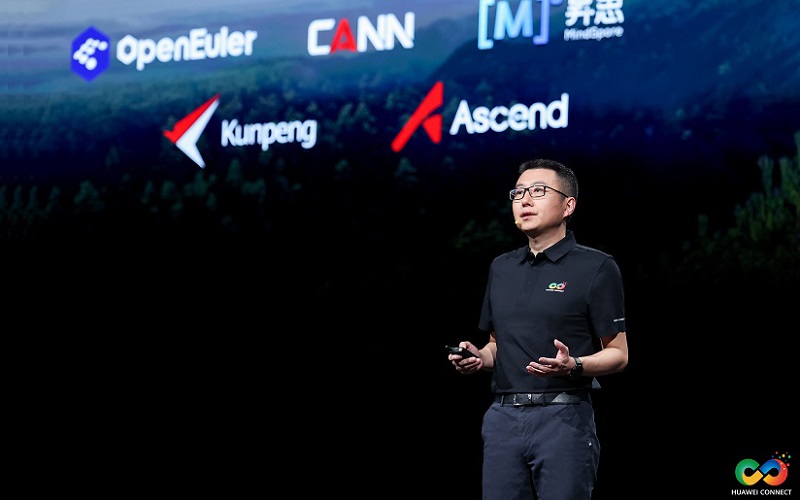Accelerate Kunpeng Ascend native innovation and help thousands of industries achieve a win-win digital intelligence future
Sep 21, 2024
[Shanghai, China, September 21, 2024] During HUAWEI CONNECT 2024, Huawei said it will continue to promote the development of Kunpeng and Ascend computing industries and native innovation, announcing that it will develop more than 1,000 Kunpeng native development partners by 2025, empowering millions of native talents, incubating thousands of native projects, and empowering thousands of enterprises to innovate natively in the next three years.
Zhang Xiwei, President of Huawei's computing product line, said that in terms of technological innovation, Huawei insists on focusing on the five major technologies of Kunpeng, Ascend, Euler, CANN, and Ascend, and continues to make breakthroughs around hardware architecture, system architecture, and cluster architecture, building a solid foundation for the computing industry. In terms of ecology, we will firmly implement the ecological strategy, open source and open capabilities, and work with partners and developers to build a computing ecosystem. In terms of talents, we always attach importance to the cultivation of native talents in colleges and universities, enable scientific research incubation, and stimulate cutting-edge innovation.

Zhang Xiwei, President of Huawei's Computing Product Line, delivered a keynote speech
Kunpeng's ecosystem is developing rapidly, and it plans to develop more than 1,000 native development partners
Kunpeng moves from migration adaptation to native development, realizing the construction of multi-platform versions at one time, with higher efficiency and better performance. At the end of 2023, Huawei launched the Kunpeng native development plan, and more than 200 leading partners have achieved Kunpeng native development, covering core systems in finance, operators, government, power and other industries, and it is planned that by 2025, Kunpeng will have more than 1,000 native development partners, covering mainstream applications in the industry, and jointly accelerating the application innovation of digital intelligence infrastructure.
openEuler enables heterogeneous computing power fusion and enables AI to run efficiently
Under the guidance of the Open Atom Open Source Foundation, through the efforts of the community and all developers, openEuler has achieved leapfrog development. In 2023, the openEuler series will account for 36.8% of the new server operating system market in China, ranking first in the market.
As the initiator and core contributor of the openEuler community, Huawei has always practiced and continued to innovate. Facing the trend of intelligent acceleration and digital intelligence integration, Huawei will continue to strengthen investment and contribute to the Euler community. Build openEuler into the best open source operating system for digital intelligence infrastructure.
Ascend continues to upgrade the basic software and hardware platform to accelerate the native innovation of large models and the implementation of inference applications
The evolution of AI technology has given birth to a new computing paradigm, and with the evolution of large model technology, the expansion of effective training computing power and the utilization of inference resources are facing challenges. CANN 8.0 adds more than a dozen types of general computing fusion operators such as NB 2.0, as well as APIs such as communication and matrix operations, to improve model training performance and greatly reduce operator development workload. MindSpore version 2.4 has a native affinity hypernode architecture, innovatively creates high-dimensional Tensor parallel and long sequence parallelism, and re-encapsulates the dynamic and static unification capability into a high-level API to further improve model training efficiency. Ascend inference engine MindIE supports adaptive PD separation deployment capabilities, provides heuristic parallel decoding capabilities, and supports automatic splitting of long sequences into multiple short sequences for inference, achieving more efficient inference with limited resources and better meeting the economics of enterprise AI implementation.
To cultivate native innovative talents, the Kunpeng Ascend Science and Education Innovation Incubation Center was officially released
In the next three years, Huawei plans to invest 1 billion yuan per year to develop the native ecosystem and talents of Kunpeng and Ascend, and in the next three years, it will empower millions of native talents, incubate thousands of native projects, empower thousands of enterprises to innovate natively, cultivate talents with the latest technology, and lead the industry with innovative talents.
At the meeting, Huawei announced the launch of a 100,000-piece Kunpeng development board and Ascend inference development board donation program to encourage university talents and developers to carry out teaching experiments, competition practices, and technological innovation. At the same time, Huawei, together with Fudan University, Harbin Institute of Technology, Huazhong University of Science and Technology, Xi'an Jiaotong University, Nanjing University, Beihang University, Beijing Institute of Technology, University of Electronic Science and Technology of China, Southeast University, and Beijing University of Posts and Telecommunications, released the Kunpeng Ascend Science and Education Innovation Incubation Center, which builds an important hub connecting universities, enterprises, and scientific research institutions, provides a talent training platform, accelerates the incubation of scientific research achievements, and contributes to the prosperity of the computing industry.